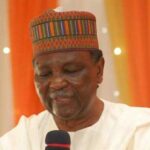
Everything I need in life, this country has given me. I’m the one who needs to give back.” – Atiku Abubakar
Atiku Abubakar is an outstanding Nigerian. As a politician he has built bridges of national unity across regional and religious lines, contributed to the evolution of our democracy and advanced the cause of the less privileged. As a businessman he has set up and managed successful businesses that provide a source of livelihood for thousands of Nigerians. As an educationist and philanthropist, Atiku has blazed the trail in bringing international standards of education to Nigeria and helped thousands of underprivileged persons with access to a better life.
His success stories in public life, business, politics and philanthropy speak to the core values of hard work, determination, courage, industry, patriotism, tolerance and a generous commitment to giving back to society.
Though far from perfect – like most human beings – his life in very many ways provides good lessons that his peers, aspiring politicians or businessmen and the youth can emulate. And it is for these reasons that his birthday is well deserving of this analysis.
On Friday, 25th November, the former Vice President under the Obasanjo administration, very well preserved for his age, hit the 70th birthday mark. The goodwill messages were many and they cut way across party lines. They ranged from President Muhammadu Buhari who acknowledged his contributions to education and philanthropy to party leaders across the major political parties in Nigeria.
For instance, former President Goodluck Ebele Jonathan called him a patriot and a leader whose service to humanity is noteworthy; the All Progressives Congress (APC) called him a detribalized leader, political icon and philanthropist. Former governor of Lagos State and All Progressives Congress stalwart, Asiwaju Bola Ahmed Tinubu, described him as a dear brother, a man of faith and a leader of substance.
It is a shared consensus by many analysts that Atiku Abubakar is one of the very few leading Nigerian politicians with an appeal that is truly national. As the vice president under Obasanjo, Atiku cultivated a very good relationship with the state governors. His capacity for accommodation and understanding endeared the governors to him. Because of the powerful hold that governors had on the political structures of their home state, the relationship gave him very strong clout. It is widely rumoured that had he decided and insisted on contesting the 2003 elections against his principal, former president Olusegun Obasanjo, he would have easily secured the party nomination. Most of the governors were in his hands and would have chosen him over Obasanjo. But he did not succumb to the pressure because the Turakin Adamawa did not want to breach the unwritten rule of power shift between the South and North, which he had helped to fashion at the formative days of the PDP.
The former Vice President has within the past three decades of being in the public spotlight shown that his brand of politics is not defined by any regional imperial agenda and that he is not a religious bigot. Though a devout Muslim, there is no tinge of fanaticism in his actions. Those who know him attest to his ability to work very well with Christians and the premium he places on merit over religious and other sentimental considerations.
Atiku is as much at home in the south as he is in the north where he comes from. His fourth wife – Jemila Atiku Abubakar (Jennifer Iwenjora) – is an Igbo lady from the South East. This makes him an in-law to the Igbos. INTELS, a logistics company which he co-founded in the 1980s is based in Lagos, Calabar, Warri and Port Harcourt in the South West and South-South.
He has a huge network of friends in politics and business. These power networks span all shades, regions and religions.
In a highly polarized political system such as ours, it is difficult to find such a high profile politician who has successfully maintained without contradiction a wholly national outlook like Atiku. He remains a model for appropriate political positioning for Nigerian politicians, especially those who desire to lead at the national level.
He has stood out and championed national views that not only acknowledge and reflect the growing tensions in parts of the country but also proffered practical solutions on the basis of common sense rather than regional political correctness borne out of fear of a possible loss of advantage. On the call for re-structuring by sections of the country Atiku is among the first of politicians from the north to speak in support of the call. He said that re-structuring was inevitable and advised that the government should acknowledge the call and fashion out ways to engage those that are clamouring for it on a roundtable.
As his friends, well-wishers, business and political associates mark his 70th birthday, it is important to note that his national appeal is relevant and significant within the context of our current socio-political discourse today.
Chieshe, a public affairs analyst, wrote from Lagos
 Join Daily Trust WhatsApp Community For Quick Access To News and Happenings Around You.
Join Daily Trust WhatsApp Community For Quick Access To News and Happenings Around You.


